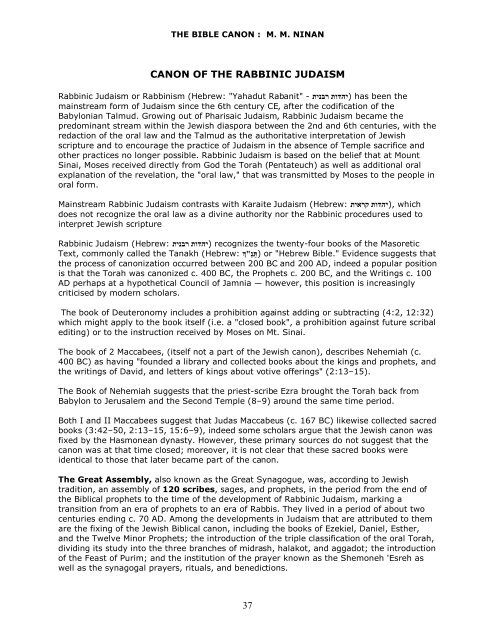You also want an ePaper? Increase the reach of your titles
YUMPU automatically turns print PDFs into web optimized ePapers that Google loves.
THE BIBLE CANON : M. M. NINAN<br />
CANON OF THE RABBINIC JUDAISM<br />
Rabbinic Judaism or Rabbinism (Hebrew: "Yahadut Rabanit" - רבנית (יהדות has been the<br />
mainstream form of Judaism since the 6th century CE, after the codification of the<br />
Babylonian Talmud. Growing out of Pharisaic Judaism, Rabbinic Judaism became the<br />
predominant stream within the Jewish diaspora between the 2nd and 6th centuries, with the<br />
redaction of the oral law and the Talmud as the authoritative interpretation of Jewish<br />
scripture and to encourage the practice of Judaism in the absence of Temple sacrifice and<br />
other practices no longer possible. Rabbinic Judaism is based on the belief that at Mount<br />
Sinai, Moses received directly from God the Torah (Pentateuch) as well as additional oral<br />
explanation of the revelation, the "oral law," that was transmitted by Moses to the people in<br />
oral form.<br />
Mainstream Rabbinic Judaism contrasts with Karaite Judaism (Hebrew: קראית ,(יהדות which<br />
does not recognize the oral law as a divine authority nor the Rabbinic procedures used to<br />
interpret Jewish scripture<br />
Rabbinic Judaism (Hebrew: רבנית (יהדות recognizes the twenty-four books of the Masoretic<br />
Text, commonly called the Tanakh (Hebrew: ) or "Hebrew <strong>Bible</strong>." Evidence suggests that<br />
the process of canonization occurred between 200 BC and 200 AD, indeed a popular position<br />
is that the Torah was canonized c. 400 BC, the Prophets c. 200 BC, and the Writings c. 100<br />
AD perhaps at a hypothetical Council of Jamnia — however, this position is increasingly<br />
criticised by modern scholars.<br />
תַּ נַ "ְך<br />
The book of Deuteronomy includes a prohibition against adding or subtracting (4:2, 12:32)<br />
which might apply to the book itself (i.e. a "closed book", a prohibition against future scribal<br />
editing) or to the instruction received by Moses on Mt. Sinai.<br />
The book of 2 Maccabees, (itself not a part of the Jewish canon), describes Nehemiah (c.<br />
400 BC) as having "founded a library and collected books about the kings and prophets, and<br />
the writings of David, and letters of kings about votive offerings" (2:13–15).<br />
The Book of Nehemiah suggests that the priest-scribe Ezra brought the Torah back from<br />
Babylon to Jerusalem and the Second Temple (8–9) around the same time period.<br />
Both I and II Maccabees suggest that Judas Maccabeus (c. 167 BC) likewise collected sacred<br />
books (3:42–50, 2:13–15, 15:6–9), indeed some scholars argue that the Jewish canon was<br />
fixed by the Hasmonean dynasty. However, these primary sources do not suggest that the<br />
canon was at that time closed; moreover, it is not clear that these sacred books were<br />
identical to those that later became part of the canon.<br />
The Great Assembly, also known as the Great Synagogue, was, according to Jewish<br />
tradition, an assembly of 120 scribes, sages, and prophets, in the period from the end of<br />
the Biblical prophets to the time of the development of Rabbinic Judaism, marking a<br />
transition from an era of prophets to an era of Rabbis. They lived in a period of about two<br />
centuries ending c. 70 AD. Among the developments in Judaism that are attributed to them<br />
are the fixing of the Jewish Biblical canon, including the books of Ezekiel, Daniel, Esther,<br />
and the Twelve Minor Prophets; the introduction of the triple classification of the oral Torah,<br />
dividing its study into the three branches of midrash, halakot, and aggadot; the introduction<br />
of the Feast of Purim; and the institution of the prayer known as the Shemoneh 'Esreh as<br />
well as the synagogal prayers, rituals, and benedictions.<br />
37


















